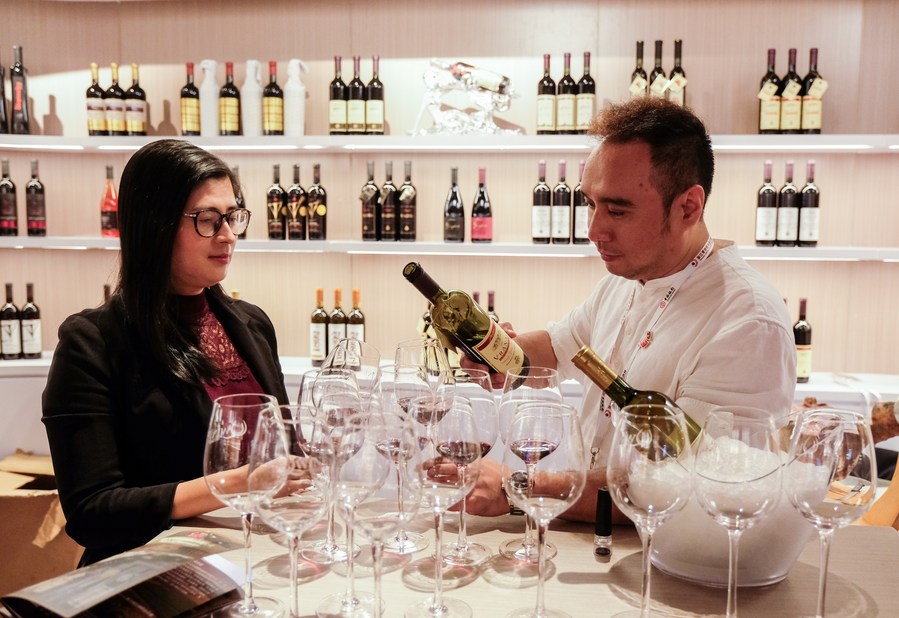
An exhibitor talks with a customer at the Overseas Chinese Import Expo in Qingtian, east China's Zhejiang Province, Nov. 16, 2019. (Xinhua/Xu Yu)
HANGZHOU, Jan. 10 (Xinhua) -- Situated on the banks of the Oujiang River amid rolling mountains, Qingtian County has both the typical charm of a southern Chinese town and the ambiance of a European city.
With a population of over 500,000, the county in east China's Zhejiang Province is the hometown of 381,000 overseas Chinese people living across 146 countries and regions around the world, of whom approximately 100,000 are engaged in the global trade industry.
It is hard to miss Qingtian's European-style architecture, which is a result of the county's global reach.
About 300 years ago, people from Qingtian began to travel west, initiating global trade ventures with European partners. Generation by generation, the Qingtian community set down roots in Europe, opening factories, restaurants and supermarkets.
In the past, Qingtian people brought complex stone carvings from China around the world. Today, younger generations are returning to Qingtian with European commodities such as coffee and wine.
Zhou Yong, who is from Qingtian and worked and did businesses in Europe for 28 years, in 2015 learned that his hometown had introduced supportive policies to attract overseas Chinese entrepreneurs and established the Qingtian Imported Commodity City, a trading center for imported goods.
Zhou then returned to Qingtian and opened a wine experience center where people could learn about Italian wine culture and enjoy Italian cuisine.
Statistics show that nearly 150,000 Qingtian natives living overseas have returned home to invest in the county, and more than 500 enterprises in Qingtian have investment from overseas Chinese people.
With the rapid development of Qingtian's foreign goods imports, the returning overseas Chinese community has acted as a bridge, attracting many Italian merchants and brands to expand into the Chinese market.
Italian wine merchant Riccardo Lacobone established a trading company in Qingtian alongside Zhou, his friend and business partner, to enter the Chinese market.
"I have many friends from Qingtian in Italy, so I always wanted to visit their hometown. After paying a visit, I decided to do something with my Chinese friend," Lacobone said.
Currently, Qingtian boasts the largest imported wine distribution center in China. Wines from Europe can be transported to locations in China, via Qingtian, in just 17 days, which helps significantly in promoting Italian wines to Chinese consumers.
Compared to when he first came to China, Lacobone said it is now much more convenient to open a company in the country. The local government has simplified procedures and provided services more efficiently, he noted. These improvements have reinforced his determination to invest in China and collaborate with his Chinese business partners.
"I even hope that my son can take over my business in China after he graduates," he said.
At the Overseas Chinese Imported Commodities Expo last November, Lacobone introduced more than 70 Italian wine merchants to the Qingtian Imported Wine Trade Fair, aiming to familiarize more Italian vintners with Qingtian and to introduce Italian wine brands to Chinese consumers.
Ruben Rabatti from Italy's Cantine Settesoli Group said, "It was my first time to attend the expo in Qingtian. I've witnessed the robust strength of the Chinese wine market here. I was surprised to find many professional exhibitors and buyers, and have exchanged contacts with more than 10 prospective buyers."
Qingtian has been hosting the expo since 2018. It has promoted the county's trade and import industry, and successfully introduced high-quality European products like wine and coffee to the Chinese market.
Data show that during last year's expo, Qingtian signed 540 import brand authorization agreements, contracting nearly 200 overseas wineries and 27 coffee companies to establish businesses in Qingtian.




 A single purchase
A single purchase









